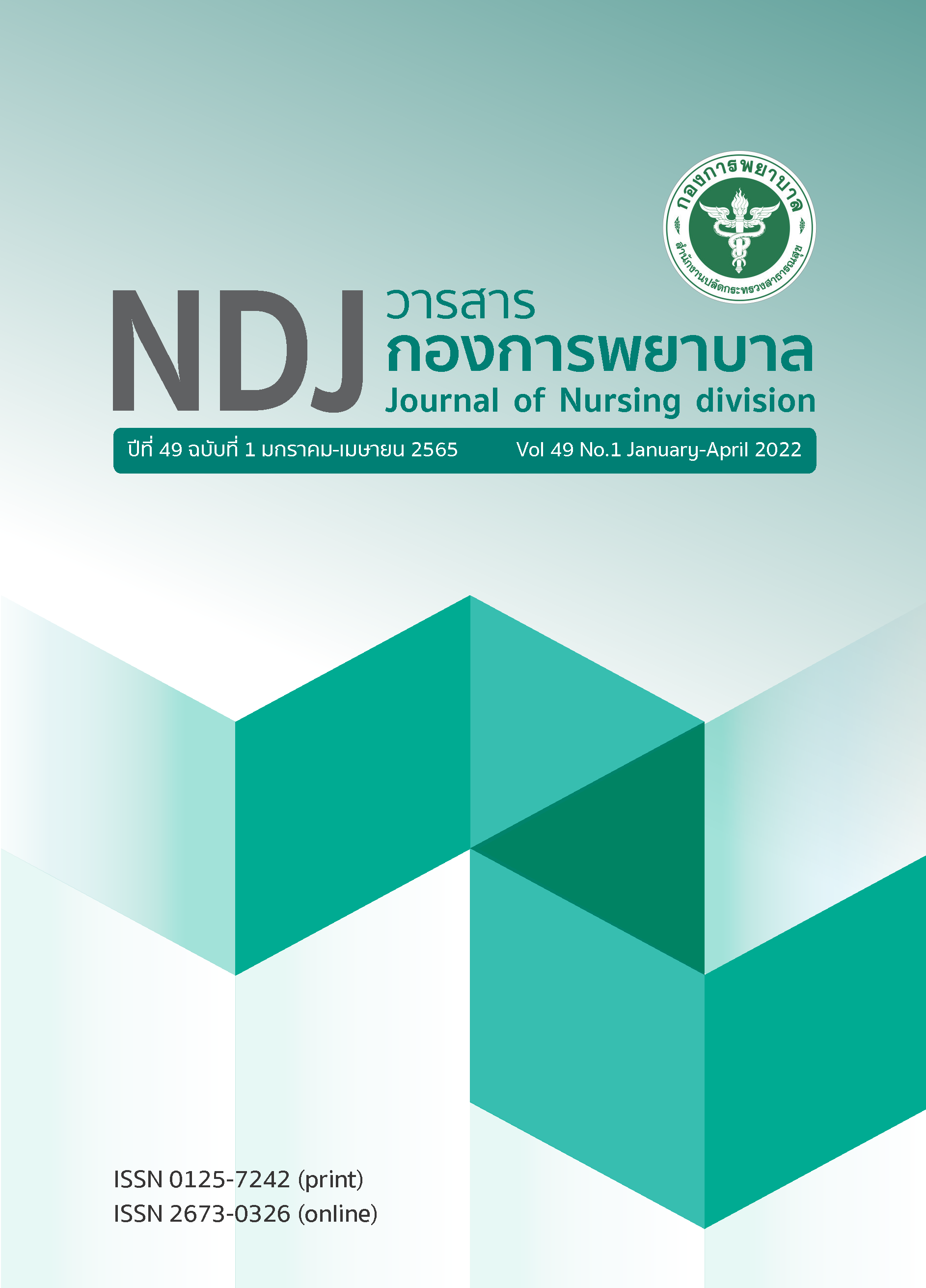ผลของการใช้ Role play simulation ต่อความมั่นใจ ทักษะการสื่อสาร และทักษะการปฏิบัติ การพยาบาลเยี่ยมบ้านของนักศึกษาพยาบา
Main Article Content
บทคัดย่อ
การวิจัยนี้เป็นการวิจัยกึ่งทดลอง(Quasi-Experimental Research) แบบ 1 กลุ่มวัดผลก่อนหลังการทดลอง มีวัตถุประสงค์เพื่อศึกษาผลของการใช้ role play simulation ต่อความมั่นใจ ทักษะการสื่อสาร และทักษะการปฏิบัติการพยาบาลเยี่ยมบ้านของนักศึกษาพยาบาล กลุ่มตัวอย่าง คือนักศึกษาพยาบาลชั้นปีที่ 3 ที่ลงทะเบียนเรียนวิชาการพยาบาลอนามัยชุมชน ภาคการศึกษาที่ 1 ปีการศึกษา 2564 เลือกแบบเจาะจง (purposive sampling) จำนวน 50 คน แบ่งเป็นกลุ่ม 5 กลุ่มละ 10 คน เครื่องมือที่ใช้ในการวิจัย คือ 1) แบบประเมินความมั่นใจ 2)แบบประเมินทักษะการสื่อสาร 3) แบบประเมินทักษะการปฏิบัติการพยาบาลเยี่ยมบ้าน วิเคราะห์ข้อมูลโดย ร้อยละ ค่าเฉลี่ย ส่วนเบี่ยงเบนมาตรฐาน และ paired sample t-test
ผลการวิจัยพบว่า ผลของการใช้ Role play simulation ต่อความมั่นใจในการปฏิบัติการพยาบาลเยี่ยมบ้านของนักศึกษาพยาบาลหลังการทดลองสูงกว่าก่อนการทดลอง (mean=3.88, SD=0.23 และ mean=3.68, SD=0.26) เมื่อเปรียบเทียบผลก่อนหลังการทดลองพบว่าคะแนนเฉลี่ยความมั่นใจในการปฏิบัติการพยาบาลเยี่ยมบ้านของนักศึกษาพยาบาลพบว่ามีความแตกต่างกันอย่างมีนัยสำคัญทางสถิติที่ระดับ .05 (t=-6.07) คะแนนทักษะการสื่อสารในการเยี่ยมบ้านของนักศึกษาพยาบาลหลังใช้ role play simulation อยู่ในระดับมากถึงมากที่สุด และคะแนนทักษะการปฏิบัติติการพยาบาลเยี่ยมบ้านของนักศึกษาพยาบาลหลังการทอลองส่วนใหญ่ปฏิบัติได้อย่างชำนาญ จากผลการศึกษานี้สามารถนำการใช้ Role play simulation มีช่วยเพิ่มความมั่นใจในการปฏิบัติการเยี่ยมบ้าน ส่งเสริมทักษะการสื่อสารในการเยี่ยมบ้านและส่งเสริมทักษะการปฏิบัติติการพยาบาลเยี่ยมบ้านของนักศึกษาพยาบาลได้
Article Details

อนุญาตภายใต้เงื่อนไข Creative Commons Attribution-NonCommercial-NoDerivatives 4.0 International License.
เอกสารอ้างอิง
Ketsuda Ponglangka A study of the use of role-play activities in the development of speaking abilities. English of Mathayomsuksa 5 students. Thesis. Master of Arts degree program. Department of Teaching English as a Foreign Srinakharinwirot University. 2007. Thai.
Supavinee Lohaprasert. Research report in the classroom on the development of assertive behavior using the method Role play of first year students in Tourism Business Management in industrial course Tourism, semester 1/2013 (Research Report). Yala : Yala Rajabhat University. 2013. Thai.
Arnone MJ, Conti PR, Preckajlo HJ. Roleplay simulation of therapeutic communication for nursing students in a psychiatric nursing course. International Journal of nursing. 2021;8(2): 1-7.
Suchada Thimontri. The effectiveness of the use of role-playing in teaching. Songkhla: Prince of Songkla University. 2013. Thai.
Kesten, KS. Role-play using SBAR technique to improve observed communication skill in senior nursing students. [Electrical version]. Journal of Nursing Education, 2011. 50(2), 79-87. PMid: 21210611.
Mi Yu, Kyung ja Kang. Effectiveness of a role-play simulation program involving the SBAR technique: A quasi-experimental study. [Electrical version]. Nursing Education Today, 2017. 53, 41-47.
Tomova S, kilikova M, Bartonickova D, Kalankova D. Combination of the role-playing method and video training in undergraduate nursing studies. Journal of nursing and social sciences related to health and illness.2020;22(1): 27-32.
Tisana Kamanee. Science of teaching. 19th ed. Bangkok : Chulalongkorn University printing press. 2015. Thai.
Wanida Tantichatchawanwong. Developing English Conversation Skills 1 by role-playing activities on Opinions of 2nd year vocational certificate students in sales field, Wimonsriyan College of Technology (Research Report). Bangkok : Ramkhamhaeng University. 2013. Thai.
Supawadee Kruachottikul, Sakawduean Oatme. The Effects of using role-Play to self-efficiency in maternal-child nursing and midwifery l student nurses of Saint Louis college. Journal of health and health management, 2020;6(2):28-38. Thai.
Rangson Maraphen. Development of learning instructional model by using standardized patient in simulation base in community health nursing. Program of Ph. D. Development Education Graduate School, Silpakorn University Ph. D. 2019. 297. Thai.
Reierson IÅ, Sandvik L, Solli H, Haukedal TA, Husebø SE. (2020). Psychometric testing of the Norwegian version of the Simulation Design Scale, the Educational Practices Questionnaire and the Student Satisfaction and Self-Confidence in Learning Scale in nursing education. International Journal of Nursing Studies Advances, 2, 100012. https://doi.org/10.1016/j.ijnsa.2020.100012.
Boonchom Srisaat. Preliminary research. (10th edition). Bangkok : Suwiriyasan. 2017. Thai.
Baird T, Corey VR, Sissom J, Weber J, Campbell SH. (2021). Testing the Validity and Reliability of the Adapted Health Communication Assessment Tool©. Clinical Simulation in Nursing, 52, 50-58. https://doi.org/10.1016/j.ecns.2020.11.001.
Valizadeh l, Akbarzadeh B, Ghiyasvandiyan S. et al. The effects of role play simulation and demonstration on pediatric peripheral venous catheter insertion skill among nursing students: A three group experimental study. Nursing and midwifery studies. 2021;10: 1-6.
Khan S. Role play: A teaching strategy that adds fun in learning. International Journal of current research. 2017;9(8) :55916-55919.
Dawood E. Nursing students’ perspective about role-play as a teaching strategy in psychiatric nursing. Journal of education and practice. 2013;4(4): 38-48.
Ronning S, Bjorkly S. The use of clinical role-play and reflection in learning therapeutic communication skills in mental health education: an integrative review. Advances in medical education and practice.2019;10: 415-425.


